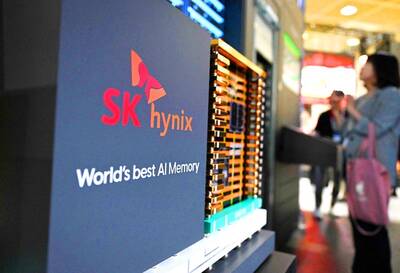Taiwan recorded the third-highest growth rate among Asian countries in terms of crude steel production for last year, with a total production of 20.21 million tonnes, the government's statistics agency said yesterday.
Citing statistics compiled by the International Iron and Steel Institute (IISI), the Directorate General of Budget Accounting and Statistics officials said world crude steel production for last year totaled 1.22 billion tonnes, up 9.6 percent from 2005, with production in the Asia region accounting for more than half of the world total.
The officials noted that among Asian countries, China recorded a 19.5 percent growth in crude steel production, the highest among all Asian countries, followed by India's 12.7 percent and Taiwan's 8.8 percent.
China was the largest crude steel producer in Asia last year, with a total volume of 422.55 million tonnes, followed by Japan's 116.23 million tonnes and South Korea with 48.42 million tonnes.
IISI statistics also show that Europe produced 230 million tonnes of crude steel last year and the Americas turned out 177.2 million tonnes. Russia had 70.76 million tonnes of crude steel last year, while Ukraine supplied 40.48 million tonnes, the statistics showed.
IISI is a non-profit organization that represents more than 190 steel producers, national and regional steel industry associations and steel research institutes.
It was founded in 1967.

Intel Corp chief executive officer Lip-Bu Tan (陳立武) is expected to meet with Taiwanese suppliers next month in conjunction with the opening of the Computex Taipei trade show, supply chain sources said on Monday. The visit, the first for Tan to Taiwan since assuming his new post last month, would be aimed at enhancing Intel’s ties with suppliers in Taiwan as he attempts to help turn around the struggling US chipmaker, the sources said. Tan is to hold a banquet to celebrate Intel’s 40-year presence in Taiwan before Computex opens on May 20 and invite dozens of Taiwanese suppliers to exchange views

Application-specific integrated circuit designer Faraday Technology Corp (智原) yesterday said that although revenue this quarter would decline 30 percent from last quarter, it retained its full-year forecast of revenue growth of 100 percent. The company attributed the quarterly drop to a slowdown in customers’ production of chips using Faraday’s advanced packaging technology. The company is still confident about its revenue growth this year, given its strong “design-win” — or the projects it won to help customers design their chips, Faraday president Steve Wang (王國雍) told an online earnings conference. “The design-win this year is better than we expected. We believe we will win

Power supply and electronic components maker Delta Electronics Inc (台達電) yesterday said it plans to ship its new 1 megawatt charging systems for electric trucks and buses in the first half of next year at the earliest. The new charging piles, which deliver up to 1 megawatt of charging power, are designed for heavy-duty electric vehicles, and support a maximum current of 1,500 amperes and output of 1,250 volts, Delta said in a news release. “If everything goes smoothly, we could begin shipping those new charging systems as early as in the first half of next year,” a company official said. The new

SK Hynix Inc warned of increased volatility in the second half of this year despite resilient demand for artificial intelligence (AI) memory chips from big tech providers, reflecting the uncertainty surrounding US tariffs. The company reported a better-than-projected 158 percent jump in March-quarter operating income, propelled in part by stockpiling ahead of US President Donald Trump’s tariffs. SK Hynix stuck with a forecast for a doubling in demand for the high-bandwidth memory (HBM) essential to Nvidia Corp’s AI accelerators, which in turn drive giant data centers built by the likes of Microsoft Corp and Amazon.com Inc. That SK Hynix is maintaining its